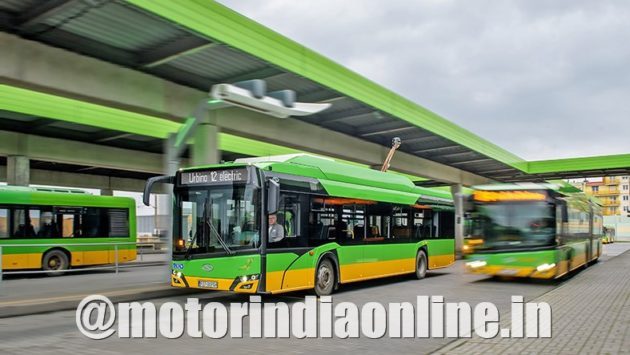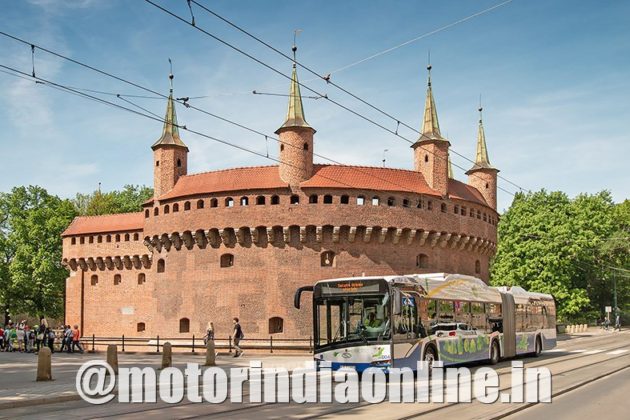The Polish bus maker has received two separate orders for 50 and 37 electric buses for the cities of Cracow and Poznań in Poland respectively. The brand’s order volume so far in totality across all markets consists of about 1,000 units, says Dhiyanesh Ravichandran

Bolstering up its position as the leading electric bus manufacturer in Europe in terms of sales volume, Solaris Bus and Coach has bagged noticeable orders for battery-electric buses from its home market. At present, Poland is the fifth-largest market for e-buses in the continent for the bus maker in terms of volumes, in which the company boasts a 70 per cent market share. In the last week of May, two notable orders – one from MPK S.A. of Cracow and the other from MPK Poznañ – have brought the brand to yet another spotlight in the EV industry.
Cracow public transport operator Miejskie Przedsiêbiorstwo Komunikacyjne S.A. (MPK) is a repeat customer of the Solaris brand, which already runs some 28 battery buses produced by the manufacturer. The latest order covers the delivery of 50 Solaris Urbino 18 electric articulated buses (18-metres) as well as 50 plug-in charging devices, all worth PLN 165,435,000. These vehicles are expected to be delivered within a year from the contract signing. They will be able to carry 141 passengers, with a seating capacity of 43.
“We perceive the decision to buy 50 more electric buses of Solaris as confirmation of the positive experience the operator has had using Solaris electric vehicles; experience resulting not only from the high quality of the vehicles as such but also from the professionally designed maintenance service. We are proud that we have a real impact on the improvement of air quality in Cracow,” says Petros Spinaris, Deputy CEO of Solaris Bus & Coach, in charge of Sales, Marketing and Customer Service.

These Urbino 18 electric buses are to be propelled by electric axes with integrated electric motors. The design of the articulated buses will be adapted to two recharging modes: employing a 4-pole roof-mounted pantograph placed above the first vehicle axis, or using a plug-in charger. Meanwhile, energy will be stored in high-density Solaris High Energy+ batteries. Other key features include a monitoring system, a passenger information system, air-conditioning, USB charging ports, and an electric heating system. Wheelchair-bound persons will be able to take advantage of platforms facilitating boarding and alighting of the bus. The ramps will be installed at the second door.
In just a few days after the Cracow contract, Solaris confirmed another deal with Poznañ’ operator MPK for supplying 37 fully-electric buses, including 31 units of Urbino 12 and 6 units of Urbino 18 articulated. The contract is worth over PLN 90 million and the deliveries are set for autumn 2021. The city is already running an e-bus fleet of 21 vehicles manufactured by Solaris.
Petros Spinaris noted, “In Solaris, we believe that the future of public transport will be electrically-powered, and therefore we are very pleased that MPK Poznañ decided to transform its fleet opting for emission-free Urbino electric buses. Investments in sustainable urban transport will allow for a high quality of air in the city and the quality life of its residents, which makes Poznañ one of the most modern metropolises in Europe”, upon signing the contract.
All these 37 buses will be powered by Solaris High Power batteries designed for fast charging. The Urbino 12 vehicles will feature 4 packs with a capacity of over 120 kWh, whereas the articulated units will be fitted with 6 packs boasting a capacity of over 180 kWh. Throughout the day the batteries will be recharged by a few fast pantograph chargers located at the bus terminals. The driveline of the Urbino electric will consist of an electric axle with two integrated motor of 125 kW power each. As a novelty, the bus will be fitted with a traction inverter produced in the innovative SiC technology, i.e., using silicon carbide, which will allow reducing the energy consumption on the bus.
The air-conditioned buses will be monitored by a system of indoor and outdoor cameras monitoring the right side of the bus and the pantograph. For the passengers’ comfort, there will be a comprehensive passenger information system available onboard consisting of readable modern destination displays, interior displays, a voice announcement system, and screens displaying information generated by the operator. What is more, completely low-floor vehicles will have a dedicated room for wheelchairs. They will also feature space for bicycles and USB charging ports as well as external door lighting.